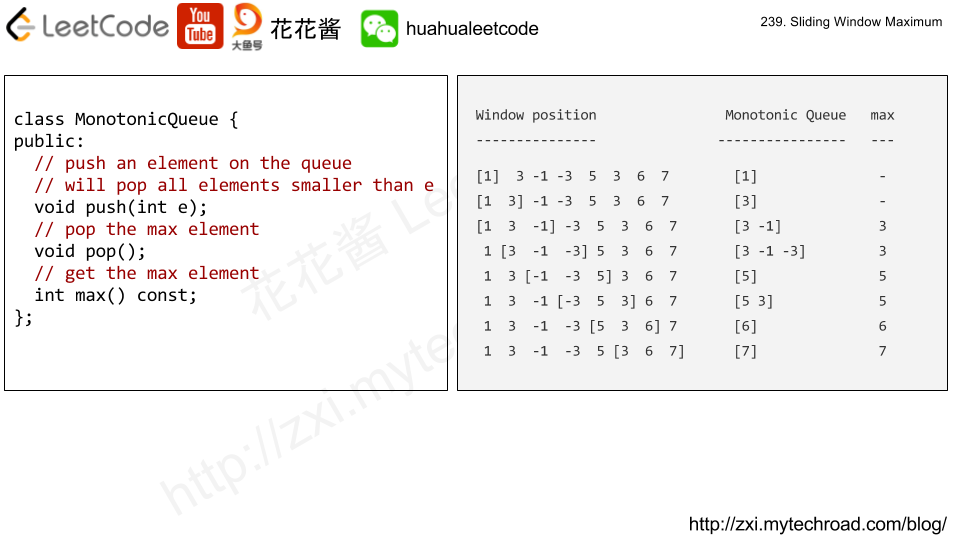239. Sliding Window Maximum
Tags: ‘Heap’, ‘Sliding Window’
Given an array nums, there is a sliding window of size k which is moving from the very left of the array to the very right. You can only see the k numbers in the window. Each time the sliding window moves right by one position. Return the max sliding window.
Example:
Input: nums =[1,3,-1,-3,5,3,6,7], and k = 3 Output:[3,3,5,5,6,7] Explanation:Window position Max --------------- ----- [1 3 -1] -3 5 3 6 7 3 1 [3 -1 -3] 5 3 6 7 3 1 3 [-1 -3 5] 3 6 7 5 1 3 -1 [-3 5 3] 6 7 5 1 3 -1 -3 [5 3 6] 7 6 1 3 -1 -3 5 [3 6 7] 7
Note:
You may assume k is always valid, 1 ≤ k ≤ input array's size for non-empty array.
Follow up:
Could you solve it in linear time?
Solution
Brute force:length of out put is n-k+1, Time O((n-k+1)*k) O(nk) Space O(1)
public int[] maxSlidingWindow(int[] nums, int k) {
if (k == 0) return new int[0];
int[] result = new int[nums.length - k + 1];
for (int i = k - 1; i < nums.length; i++) {
int max = nums[i];
for (int j = 1; j < k; j++) { //
if (nums[i - j] > max) max = nums[i - j];
}
result[i - (k - 1)] = max;
}
return result;
}
MaxHeap Solution. Since we know each time which number to add/remove, just maintain a MaxHeap of size k. Time O(nlogk) Space O(k)
class Solution {
public int[] maxSlidingWindow(int[] nums, int k) {
if (k == 0) return new int[0];
int[] result = new int[nums.length - k + 1];
PriorityQueue<Integer> heap = new PriorityQueue<Integer>(new Comparator<Integer>() { // Max heap
@Override
public int compare(Integer x, Integer y) {
return Integer.compare(y, x);
}
});
for (int i = 0; i < k; i++) {
heap.add(nums[i]);
}
result[0] = heap.peek();
for (int i = k; i < nums.length; i++) {
heap.remove(nums[i - k]);
heap.add(nums[i]);
result[i - k + 1] = heap.peek();
}
return result;
}
}
Solution 3, best. Using Monotonic Queue 
Time O(n) Space O(k)
class Solution {
public int[] maxSlidingWindow(int[] nums, int k) {
if (k == 0) return new int[0];
int[] result = new int[nums.length - k + 1];
Deque<Integer> mono = new LinkedList<>(); // storing index
for (int i = 0; i < nums.length; i++) {
while (mono.size() > 0 && nums[i] > mono.getLast()) {
mono.removeLast();
}
mono.addLast(i);
if (i - k + 1 >= 0) { // can be add to result
result[i - k + 1] = nums[mono.getFirst()];
}
if (i - k + 1 >= mono.getFirst()) { // remove first if size reach limit k
mono.removeFirst();
}
}
return result;
}
}